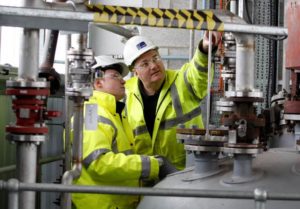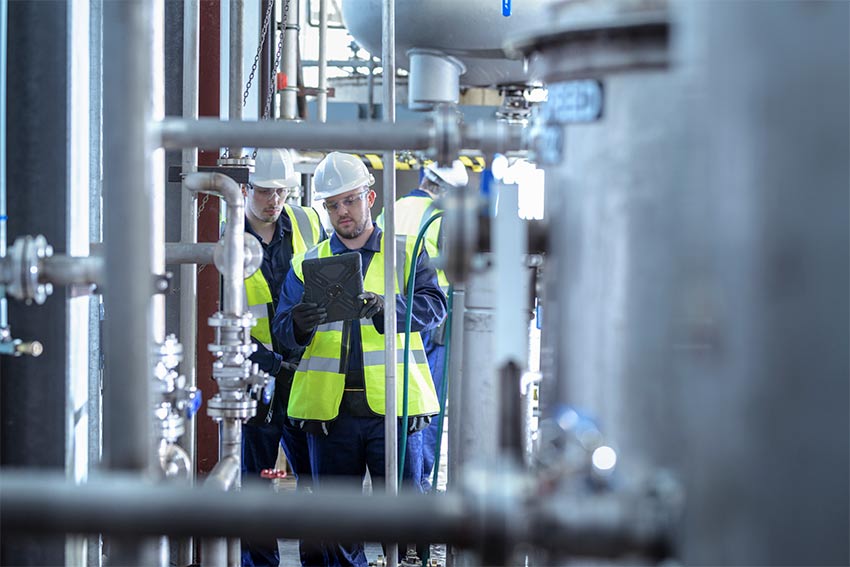The Government needs to move away from vague and ambiguous targets and give a clear policy direction to ensure the UK seizes the industrial and decarbonisation benefits of carbon capture usage and storage (CCUS), says the Business, Energy and Industrial Strategy (BEIS) Committee in a report published today. The report says CCUS is necessary to meet national and international climate change targets at least cost and argues the technology could play a significant role in supporting productivity growth outside London and the South East.
The UK is considered to have one of the most favourable environments globally for CCUS, but the technology has suffered from 15 years of turbulent policy support, including the cancellation of two major competitions at a late stage. No commercial-scale plant has yet been constructed in the UK.
Carbon capture, usage and storage (CCUS) is a set of technologies which can together capture carbon dioxide from waste gases, and either ‘lock up’ this carbon dioxide in long-term storage or use it in industrial processes.
The report notes that in the UK, failure to deploy CCUS could double the cost of meeting our targets under the Climate Change Act 2008, rising from approximately 1% to 2% of GDP per annum in 2050.
Failure to deploy CCUS would also mean the UK could not credibly adopt a ‘net zero emissions’ target in line with the Paris Agreement’s 1.5°C aspiration. This latter target is a more ambitious policy on which the Committee on Climate Change will set out next week (on 2nd May) whether the Government should commit to a net-zero target and the date to achieve it.
The report recognises the Energy Minister’s personal commitment and support for CCUS but finds there is a lack of clarity concerning the Government’s ambitions for CCUS, both in terms of time-scale for deployment of CCUS and the level of costs reductions the Government is demanding from the technology before it gives it support.
Anna Turley, Labour MP for Redcar and Member of the Business, Energy and Industrial Strategy Committee, said: “The UK has an opportunity to lead the world in the development of a new CCUS industry. In addition to helping to tackle UK carbon emissions, CCUS can play a crucial role in delivering much needed investment in skills and infrastructure and supporting regional growth and jobs.
“The current Energy Minister has been a champion for CCUS, and there have been some encouraging recent developments, but the CCUS industry has been the victim of years of turbulent policy support and suffered a series of false dawns. The Government now needs to give the ‘green-light’ to CCUS and ensure that we seize the domestic growth and jobs opportunities of this modern, green industry.
“CCUS is crucial to meeting the UK’s climate change targets and will be vital to achieving a ‘net zero’ target. But Government support is needed to make CCUS a reality. The Treasury needs to shake off the blinkers in its attitude to CCUS, take a more nuanced approach to the costs but also recognise the benefits. CCUS is the best and most cost-effective way to reduce our carbon emissions. Without CCUS many of our heavy industries could face closure. CCUS has a critical role to play in decarbonising our economy and modernising UK industry – the Government should now throw its full support behind CCUS and put the right policy levers in place to ensure that this technology can deliver on its potential.”
Rather than seeking unspecified cost reductions, the report says the Government should kick-start CCUS by aiming to bring forwards projects at least cost. The report also says the ambition to “deploy CCUS at scale during the 2030s” is so broad as to be meaningless, recommending the Government provide clarity by adopting specific targets in line with the Committee on Climate Change’s recommendation [see paragraph 16 of the report].
The Government has set a target to commission the first CCUS facility by the mid-2020s. Five clusters – Teesside, Humberside, Merseyside, South Wales, North East Scotland – have been identified as well suited to early CCUS deployment. The report recommends this ambition is raised to target the development of first CCUS projects in at least three clusters by 2025.
The report also recommends that the Government consider an alternative to running a third competition for funding and urgently consult on approaches to allocate funding for CCUS industry clusters, to ensure that the approach selected promotes collaboration and benefits CCUS development across the UK.
The report recommends that the forthcoming Comprehensive Spending Review take account not only of CCUS’ costs, but also its wider benefits – notably to extend the lifetime of heavy industries which will otherwise need to close under the requirements of the Climate Change Act. The Committee also recommends the Government task the National Instructure Commission – or a third party – to conduct a cost benefit analysis of the potential role of CCUS to decarbonise industrial emissions and that the results of this assessment should be taken into account during decision-making on spending for national infrastructure.
The report recognises CCUS as a particularly useful technology in tackling carbon emissions, with its potential application to many different areas of the economy. For example, carbon capture technology can decarbonise waste gases from power stations and industrial facilities; help to produce clean hydrogen fuel from natural gas; and remove greenhouse gas emissions from the atmosphere via bioenergy with CCS (BECCS) or direct air CCS (DACCS).
As part of this inquiry, the BEIS Committee held an evidence hearing in Teesside where it questioned representatives from the five key areas for CCUS industry clusters (Teesside, Humberside, Merseyside, South Wales, North East Scotland).





















